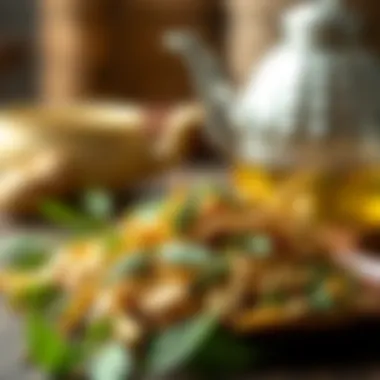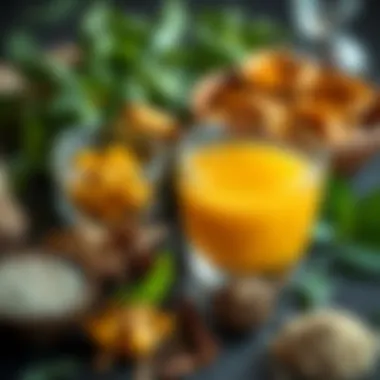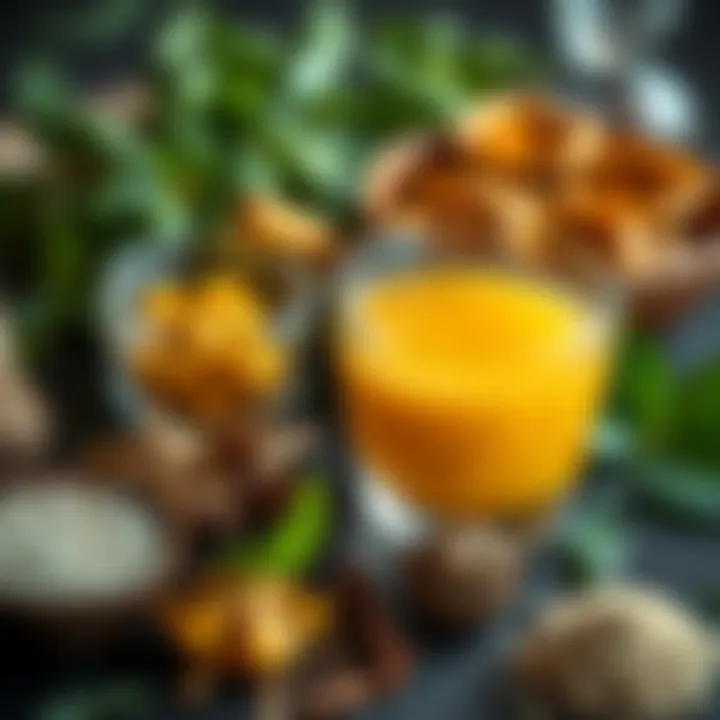Discovering the Finest Ginger Tea: Your Complete Guide


Intro
In the world of beverages, few things create a connection quite like ginger tea. This doesn't just come from its flavor, which dances on the palate, but from its myriad benefits that touch both body and spirit. Ginger tea can be a cozy companion on a chilly day or a refreshing drink during hot summer afternoons. No matter how you enjoy it, understanding the right way to brew and savor this remarkable tisane can elevate your enjoyment immensely.
Ginger, with its roots in ancient medicine, has earned its place not only in kitchens but also in the hearts of many. From its ability to support digestive health to its potential in reducing inflammation, this humble root holds a wealth of benefits. Throughout this guide, we will peel back the layers of ginger tea, revealing how to choose, prepare, and customize your cup to match your personal taste.
This exploration goes beyond merely sipping; it’s about crafting an experience. Whether you're a seasoned tea aficionado or a curious novice, you'll find valuable insights that will resonate with your culinary adventures. Sit back, brew a cup if you will, as we embark on this aromatic journey.
Understanding Ginger Tea
Ginger tea has carved a niche as a beloved beverage around the world, meriting a closer look at its multifaceted nature. Understanding ginger tea is not merely about knowing its flavor profile or health benefits, but also recognizing its cultural significance, preparation methods, and various applications in culinary practices. This section aims to shine a light on the very essence of ginger tea, setting the stage for an insightful exploration into its many facets.
Defining Ginger Tea
At its core, ginger tea is a simple concoction made by steeping fresh or dried ginger roots in hot water. This process releases the warm, spicy flavors and the health-enhancing compounds that ginger is celebrated for. Typically enjoyed as a soothing drink, ginger tea can have variations that include complementary ingredients like lemon, honey, or herbs, catering to diverse tastes and preferences. The simplicity of its preparation belies the depth it offers in flavor and health benefits, making it a staple in many households.
Historical Context
The use of ginger dates back thousands of years, with roots tracing back to ancient cultures. Historically, ginger was highly valued not just for its taste, but also for its perceived medicinal properties. From Chinese medicine to Ayurvedic practices in India, ginger has played a significant role in traditional remedies.
For instance, the ancient Greeks were known to incorporate ginger into their diets, and it was a valuable trade commodity along the spice routes. The historical reverence for ginger underscores its importance beyond just being an ingredient; it has influenced trade, culture, and health practices across civilizations. Its journey through time embodies the tale of human interaction with nature, showcasing the quest for flavor and wellness.
Culinary Use in Various Cultures
Ginger tea is not a monolithic experience; rather, it changes color and flavor across different cultures.
- In India: Masala chai, often includes ginger, showcasing its integration into daily life as a warming beverage.
- In Japan: Ginger is commonly found in shoga-yu, a warming tea enjoyed, especially during colder months, emphasizing its role in combating chill.
- In the Caribbean: Here, ginger tea is often sweetened and spiced with other aromatic herbs, turning it into a refreshing beverage that's rich in tradition.
Thus, ginger tea acts as both a beverage and a cultural artifact, reflecting local histories and preferences. Each sip connects drinkers to traditions, memories, and shared experiences, making ginger tea an integral part of culinary customs around the globe.
"Ginger tea is more than just a drink; it is a warm embrace from the past, enveloping drinkers in its rich tapestry of history and culture."
Health Benefits of Ginger Tea
Ginger tea isn’t merely a warm beverage to sip on during chilly days; it's a powerhouse of potential health benefits. As ginger has long been recognized for its medicinal properties, this tea has found its way into the wellness routines of many. In this section, we will explore the notable health benefits of ginger tea, which makes it a worthy addition to your diet.
Anti-Inflammatory Properties
Ginger is well-known for its anti-inflammatory attributes. The compounds that give ginger its distinctive taste and aroma, like gingerols and shogaols, also have the ability to reduce inflammation in the body. This can be particularly beneficial for individuals dealing with chronic pain conditions, such as arthritis or muscle soreness after exercise.
Research suggests that ginger might be as effective as some over-the-counter anti-inflammatory medications when it comes to reducing pain and swelling. Consuming ginger tea can be an easy and palatable way to incorporate ginger into your daily routine, possibly alleviating discomfort without the side effects often associated with pharmaceuticals.
To enjoy its full benefits, consider drinking ginger tea regularly. Here’s a quick overview:
- Natural Anti-Inflammatory: Helps to reduce pain and swelling.
- Alternative to Medication: May be as effective as some OTC drugs for inflammation.
Digestive Aid
If you’ve ever experienced an upset stomach, you’ll appreciate ginger’s role as a digestive aid. Drinking ginger tea can ease nausea, reduce bloating, and promote healthy digestion. This is especially useful for those who suffer from motion sickness or morning sickness during pregnancy.
Ginger works by speeding up the emptying of the stomach, ensuring that food moves through your system smoothly. Additionally, it can stimulate the production of digestive juices, enhancing overall gastric function.
Here are some digestive benefits of ginger tea:
- Eases Nausea: Particularly useful during pregnancy or travel.
- Improves Digestive Health: Stimulates the production of enzymes.
- Reduces Bloating: Helps in alleviating feelings of fullness or discomfort after a meal.
Impact on Immunity
In today’s world, maintaining a strong immune system is more critical than ever. Ginger tea can play a significant role in supporting your body's defenses. The antioxidants found in ginger help fight off free radicals and bolster your immune response.
Moreover, ginger’s antimicrobial properties make it effective against various pathogens. Including ginger tea in your routine can prepare your body to better combat infections, especially during cold and flu season.
Key takeaways about ginger tea’s impact on immunity include:
- Rich in Antioxidants: Supports the immune system by combating free radicals.
- Antimicrobial Properties: May protect against common pathogens.
- Promotes Overall Health: Regular consumption can help sustain a strong immune response.
In summary, ginger tea packs a punch when it comes to health benefits, making it more than just a delicious drink. Incorporating it into your daily regimen could lead to a plethora of health improvements, from reducing inflammation to bolstering your immune system.


Choosing High-Quality Ginger
Selecting high-quality ginger is a fundamental step in crafting a delightful and healthful cup of ginger tea. At the core, the quality of ginger directly impacts not just the flavor but also the potential health benefits that this rhizome can impart. Just like a chef wouldn’t use subpar ingredients for a fine dish, the same logic applies when brewing ginger tea. The aim here is to savor every sip, reaping not only its rich taste but also its myriad of wellness advantages.
Fresh vs. Dried Ginger
When considering ginger, one often ponders whether fresh or dried ginger is the better choice. Fresh ginger root is vibrant, aromatic, and packed with essential oils, giving your tea a punch that’s hard to match. Its taste tends to be zesty and slightly spicy, making it ideal for creating invigorating brews. Ginger root is typically recognized by its firm texture and smooth skin; any signs of shriveling may indicate aging.
On the contrary, dried ginger offers a more concentrated flavor profile. This variety is easier to store and can have a longer shelf life, which makes it particularly convenient. While it lacks some of the moisture and natural oils found in fresh ginger, its earthy warmth can complement other flavors effectively. Typically, dried ginger is ground into powder, making it versatile for both tea and culinary applications.
Ultimately, whether one leans towards fresh or dried ginger can come down to personal preference or availability. Both have their unique qualities and can be chosen based on what suits your taste or the specific recipe you are working with.
Organic vs. Non-Organic
Another consideration is whether to opt for organic or non-organic ginger. Organic ginger is cultivated without the use of synthetic pesticides, herbicides, or fertilizers. This not only aligns with health-conscious choices but also supports sustainable farming practices, which can be a significant factor for many consumers. Choosing organic ginger can ensure minimal exposure to chemicals, lending peace of mind to those preparing food and beverages.
On the flip side, non-organic ginger is generally more readily available and cost-effective. However, it may carry traces of chemicals that aren’t always easily washed away. Evaluating the purchase of organic versus non-organic means weighing considerations such as cost, access, and personal health beliefs. For those who prioritize purity and environmental stewardship, organic ginger might be the way to go.
Sourcing Tips
When it comes to sourcing high-quality ginger, a few practical tips can guide your choice. First, buy ginger from local farmers’ markets or trusted grocery stores wherever possible. Fresh produce typically exhibits better quality than mass-produced items found in larger retailers. Additionally, check for signs of freshness such as a firm texture, slight sheen, and an intact skin.
Another viable option is online purchasing. Several companies specialize in organic and specialty ingredients. Look for reputable websites or local co-ops that curate quality products. Reading reviews and checking customer feedback can also be beneficial.
Furthermore, you might consider growing your own ginger. A potted ginger plant can thrive indoors, given proper light and care, providing fresh roots right at your fingertips. This approach not only guarantees quality but also adds an interesting layer to your culinary experience.
Brewing the Perfect Ginger Tea
Brewing the perfect ginger tea is not merely a task; it's an experience, transforming a simple root into an elixir that warms the body and soothes the soul. This section serves as a guide to ensuring those perfect cups. Whether you are a novice or a seasoned tea lover, understanding the nuances of how to brew ginger tea effectively will enhance not only its flavor but also its health benefits. Selecting the right ingredients, knowing the proper steeping time and temperature, and learning how to balance flavors are all essential components that contribute to a satisfying brew.
Ingredients and Equipment
To start on the right foot, you’ll need a few basic ingredients and equipment. The main star, of course, is the ginger root itself. Fresh ginger, with its knobby skin and spicy aroma, brings a zest that dried ginger can't quite match. Organic ginger is often preferred for its robust flavor, free from pesticides.
Essential Ingredients:
- Fresh ginger root
- Water
- Optional additions like honey, lemon, or herbs
Required Equipment:
- A sharp knife or a vegetable peeler
- A chopping board
- A kettle or pot for boiling water
- A teapot or infuser if you plan to use loose ginger
- A cup or mug
The equipment doesn’t need to be fancy, but having the right tools makes a world of difference. A sharp knife will help you slice the ginger cleanly, while a kettle with a precise temperature setting is ideal for ensuring you don’t scald the tea.
Steeping Time and Temperature
Steeping time and temperature are crucial in drawing out the flavors of ginger without turning the brew bitter. Ginger tea is best steeped at around 200°F (93°C), just below boiling. You will want to ensure the water is bubbling before you add the ginger, but not boiling furiously.
- For fresh ginger, a steeping time of 5 to 10 minutes is generally recommended. The longer you steep, the stronger the flavor becomes.
- Dried ginger generally requires 3 to 5 minutes for the perfect infusion.
One tip that might be helpful is to taste as you go. This way, you can figure out exactly how strong you prefer your tea. As you play around with the time, you might discover a uniqueness that suits your palate.
Balancing Flavors
Ginger has a bold flavor that can sometimes dominate a cup. Thus, balancing that flavor is key to a harmonious brew. Using complementary ingredients such as honey or lemon can create a well-rounded drink that caters to various tastes. Here are some suggestions:
- Honey adds a natural sweetness while enhancing the immune benefits of the tea.
- Lemon juice or zest brings a sharpness that cuts through the heat of the ginger.
- Mint leaves can add a refreshing touch, making the tea more vibrant.
"The beauty of ginger tea lies in its versatility; with the right tweaks, each cup can be a new adventure."
Putting these ingredients together could lead to countless variations. Don't hesitate to experiment with amounts and combinations until you find what works for your palate. Ultimately, brewing the perfect cup of ginger tea is an art form where your preferences dictate the final masterpiece.
Variations of Ginger Tea
Exploring variations of ginger tea expands the horizons of flavor and health benefits associated with this prized root. Not only do these variations cater to different taste preferences, each combines unique elements that can enhance the tea-drinking experience. From balancing bitterness with sweetness to incorporating aromatic herbs, these variations can also meet various health goals. In this section, we’ll discuss three delightful combinations that embody the versatility of ginger tea.
Ginger-Lemon Tea
Ginger-lemon tea is a classic variant that harmoniously blends the spiciness of ginger with the zestiness of lemon. This blend is more than just a simple drink; it offers a refreshing taste tailored to invigorate both body and spirit.


The bright acidity of lemon complements ginger's warmth, making it a delightful choice for morning routines or a pick-me-up. The combination helps in detoxification, with lemon providing a good dose of vitamin C which strengthens the immune system. To prepare this blend:
- Start by boiling water, and then add freshly grated ginger.
- Allow it to steep for about 10 minutes.
- Squeeze in the juice of half a lemon and sweeten with honey if desired.
This tea is not only refreshing but also helps in easing nausea and improving digestion. Many claim that the tangy burst of lemon brightens their day just like a sprightly morning sun.
Ginger-Honey Infusion
Another delightful mix is ginger-honey infusion. This combination is known for its comforting and soothing qualities. Honey, with its natural smoothness, works as an excellent counterbalance to ginger’s punchy taste.
Adding honey can provide a pleasurable sweetness without overpowering the intrinsic flavor of ginger. This infusion is a go-to remedy for sore throats and persistent coughs, especially during the cold months. To craft this soothing beverage:
- Boil water and steep slices of ginger for about 10 minutes.
- Once steeped, remove from heat and stir in a generous spoonful of raw honey until dissolved.
The result is a sweet, warming beverage with antibacterial properties, making it a comforting friend on a chilly evening. It’s often said that this blend can bring a touch of warmth when winter winds blow, soothing both the throat and soul.
Herbal Blends with Ginger
For those wishing to explore outside conventional boundaries, herbal blends with ginger offer a wonderful avenue. Combining ginger with other herbs can create a tapestry of flavors, making each cup a unique experience. Some popular herbs to pair include mint, chamomile, and turmeric.
- Mint provides a refreshing contrast, invigorating the senses.
- Chamomile contributes a calming effect, perfectly paired when one seeks relaxation after a long day.
- Turmeric elevates the tea with its earthy notes and anti-inflammatory benefits.
Crafting an herbal blend with ginger is as simple as combining the chosen herbs with ginger slices in a pot of boiling water, steeping for 5-10 minutes. This fusion not only elevates the taste but also potentially adds an array of health benefits. Each herbal blend possesses its own set of advantages - hydration, relaxation, or inflammation reduction - thus accommodating individual health aspirations.
Through these variations of ginger tea, the possibilities expand endlessly. Each blend tells its own story while celebrating the robust flavor of ginger. Whether seeking a zesty morning mood-lifter or a comforting evening infusion, ginger remains a beloved companion in a wide array of tea variations.
Culinary Applications of Ginger Tea
Ginger tea is not just a beverage; it’s a dynamic ingredient that enhances various culinary creations. Its unique profile combines warmth and spice, making it a versatile component in cooking and baking. This section explores how ginger tea can elevate dishes, be integrated into beverages, and even star in cocktails and mocktails. Understanding these applications allows food enthusiasts to blend health with creativity, achieving delightful flavors and benefits.
In Cooking and Baking
Ginger tea can be used in cooking and baking to infuse dishes with its distinctive flavor. Using ginger tea as a base for soups or stews adds depth and a warm undertone that enhances the overall taste. For instance, replacing water or stock with ginger tea in a vegetable or chicken soup can do wonders. It brings a subtle heat that complements various spices, creating a robust flavor profile.
In baking, ginger tea lends a moist texture to cakes and muffins. A ginger tea-infused gingerbread cake can take your dessert to the next level with complexity and richness. The warm aroma that fills your kitchen while baking with ginger tea is simply irresistible.
Experimentation is always welcome: Try adding a splash of ginger tea to your pancake batter or using it in marinades for meats. The options are as vast as your imagination.
As a Beverage Ingredient
When it comes to beverages, ginger tea shines brightly. Many mixologists and home cooks alike are discovering its use in various drinks, transcending traditional hot tea. Its bold flavor makes it an excellent mixer. You can incorporate ginger tea into smoothies for an extra kick or blend it with fruit juices for a refreshing and zesty drink.
Additionally, using ginger tea to chill or infuse iced beverages gives them a unique twist. Whether it's lemonade or iced herbal tea, a splash of ginger tea complements and elevates the flavor. The natural spiciness interacts beautifully with sweetness, creating a balanced and enjoyable sip.
In Cocktails and Mocktails
The art of cocktail-making has embraced ginger tea as a vital ingredient. It brings a nuanced edge to both alcoholic and non-alcoholic beverages. A classic Ginger Tea Mojito combines ginger tea, fresh mint, lime, and a sweetener for a refreshing twist on the traditional drink. The depth of flavor from ginger tea adds a signature touch.
Mocktails are equally enhanced by ginger tea. Imagine sipping on a Ginger Peach Fizz, where ginger tea melds with peach puree and sparkling water. This drink excites the palate, combining the freshness of peach with the warmth of ginger.
In summary, the culinary applications of ginger tea enable versatile uses in cooking, baking, beverages, and cocktails. Its rich flavors enhance dishes and encourage creativity. The possibilities are extensive, and with a little enthusiasm, anyone can incorporate ginger tea into their culinary repertoire.
Ginger Tea for Specific Health Goals
Ginger tea is not just a comforting beverage; it serves as a powerful ally for various health purposes. This section focuses on how ginger tea can contribute to specific health goals, providing a blend of traditional wisdom and modern understanding. By diving into its benefits related to weight management, stress relief, and cold or flu symptom alleviation, you can grasp how incorporating ginger tea into your daily routine may enhance your well-being.
Weight Management Support
Many people today are on a quest to shed a few pounds or maintain a healthy weight. Ginger tea can play a significant role in this journey. The compound gingerol, found in fresh ginger, is known for its ability to boost metabolism. When you drink ginger tea, you might experience increased thermogenesis, which means your body burns more calories, even at rest.
Some studies have shown that ginger can help suppress hunger, reducing the desire to snack between meals. That might just come in handy if you find yourself reaching for that bag of chips when you’re not really hungry!
A simple way to enjoy ginger tea for weight management is to brew a cup before your meals. This can help prepare your digestive system, and potentially curb overeating.
Managing Stress and Anxiety
In a world that often feels overwhelmingly fast-paced, stress management is crucial. Ginger tea is thought to have calming effects that may help ease anxiety. This could be attributed to its unique chemical composition. The aroma of ginger is refreshing, and sipping a warm cup can create a moment of pause in a chaotic day.
Moreover, ginger contains phenolic compounds that aid digestive health, which is closely linked to emotional well-being. When your stomach feels unsettled, it can contribute to feelings of stress. So, a soothing cup of ginger tea may help stabilize not just your stomach but also your mood.


- Try this nice nighttime routine: Brew ginger tea, take a few moments to breathe in the scent, and let the warmth envelope you; it might just be the best antidote to a long day.
Benefits for Cold and Flu Symptoms
As the seasons change and colds become more common, ginger tea proves to be a valuable home remedy. Its warming properties can help in soothing sore throats and clearing nasal congestion. When you start feeling under the weather, a hot cup of ginger tea could bring a sense of relief.
The anti-inflammatory properties of ginger can also aid in reducing sinus pressure and even help clear up that annoying cough. It acts as a natural expectorant, promoting mucus clearance from the airways. Moreover, drinking ginger tea can help maintain hydration levels, which is vital when battling an illness.
A simple recipe to boost your ginger tea for cold relief is:
- Fresh ginger slices
- A dash of honey for soothing effects
- Lemon for added vitamin C
"Ginger tea is not just a drink; it's a tradition that supports health through generations."
In summary, ginger tea offers a plethora of benefits tailored for specific health needs, whether it’s aiding in weight management, conquering stress, or fighting off the common cold. By understanding these aspects, you can integrate ginger tea into your health regimen with confidence, creating a warm, beneficial experience with each cup.
The Art of Pairing Ginger Tea
Pairing is a delicate dance in the world of flavors, and when it comes to ginger tea, this art takes on a special significance. It’s not merely about what tastes good together; it’s about enhancing the experience, both for your palate and your overall well-being. Ginger tea, with its warming spiciness and myriad health benefits, can be paired with foods and other beverages in ways that elevate every sip. This section explores the dimensions of pairing ginger tea with various elements, unraveling layers of flavor and health benefits that come from thoughtful combinations.
Food Pairings
When it comes to food, ginger tea is surprisingly versatile. Its sharpness can cut through rich dishes, while its warmth complements light, fresh fare. Here are some notable pairings to consider:
- Spicy Asian Cuisine: Think of dishes like Thai curry or spicy Szechuan noodles. The heat from the meals marries beautifully with the warmth of ginger tea, creating a harmonious experience that feels balanced and satisfying.
- Savory Breakfasts: A bowl of oatmeal with some honey and nuts can benefit from a side of ginger tea. The earthiness of the oats combined with ginger’s zing can kickstart your morning nicely.
- Roasted Vegetables: Items like carrots or butternut squash, when roasted, become sweet and earthy, and with a cup of ginger tea, you get a delightful contrast that keeps the meal interesting.
- Cheese Platters: Consider pairing a light, creamy cheese such as brie with ginger tea. This brings out a unique flavor profile that’s unexpected yet truly enjoyable.
These pairings not only enhance the taste but also support digestion, allowing the spices in your meal to settle well.
Other Beverages
While ginger tea holds its own, it can also share the spotlight with other beverages for a nuanced experience. Here are a few options:
- Black Tea: Combine ginger tea with a robust black tea for a ginger chai experience. The tannins from the tea meld with ginger's zest, providing a warming and invigorating drink.
- Herbal Tea Blends: Experiment with herbal teas like chamomile or peppermint. Introducing ginger can strengthen the health benefits while creating a refreshing combination that calms the mind.
- Juices: Think about a ginger-lime or ginger-apple juice blend. The brightness of fresh juices can enhance the ginger’s flavor, bringing out its natural sweetness without losing its kick.
Each of these combinations opens the door to new possibilities, pushing the boundaries of what ginger tea can be.
Textures and Flavors
Pairing ginger tea isn't just a matter of taste; texture plays a significant role as well. The interplay of different textures alongside flavors adds depth to your tea experience:
- Creamy Textures: Foods such as yogurt or smooth desserts like panna cotta can create a beautiful contrast with the spiciness of ginger tea. The creaminess cushions the palate, making the ginger's bite more pronounced and enjoyable.
- Crunchy Elements: Couple crisp items, like crackers or nuts, with your cup. Their crunch adds an interactive element, making the experience more dynamic.
- Fresh Herbs: Adding mint or basil can not only introduce new flavors but also different textures. Fresh herbs bring a lively element that can lighten up the richness of ginger tea, blending interestingly with the heat of ginger.
Pairing isn’t just about flavor; it’s about creating an experience that resonates on multiple levels.
For more inspiration on ginger and its culinary uses, you can check out resources like Wikipedia, which offers a comprehensive background on this fantastic root, or explore discussions on flavors in communities like Reddit, where food lovers share their adventures.
Whether you’re cooking or enjoying a simple cup of ginger tea, being mindful of the pairings can greatly enrich your culinary experience.
Ending: Finding Your Best Ginger Tea
When it comes to concluding an exploration of ginger tea, it's critical to highlight the personal journey each individual embarks upon. The beauty of ginger tea doesn’t just lie in its health benefits or brewing methods; it wraps itself around personal experiences and unique preferences. This makes the conclusion a vital component of the article.
Choosing the best ginger tea for oneself involves understanding its various aspects—such as flavor profiles, health benefits, and potential culinary applications. As discussed, each person’s tastes can significantly differ. Some may prefer the spicy kick of raw ginger, while others lean towards the mellowness of honey and lemon mixed in. Recognizing these individual tastes can greatly influence one's enjoyment and satisfaction with ginger tea.
Personal Preferences Matter
Everyone has a different palate. It might be an acquired taste for some while a favorite for others. Factors such as what one’s mother used to make when feeling under the weather or rare spices discovered in far-off markets can affect these choices. The key is to experiment. Try varying the steeping time, add different sweeteners, or even combine it with other herbs like turmeric or peppermint. Always listen to yourself when blending flavors.
As you delve deeper into the world of ginger tea, keep in mind that not all brews will resonate with you equally. Some might hit the mark, whereas others may not speak to your preferences. Sometimes, it's the personal connection to a particular blend that makes it special.
Exploring Local Varieties
Local varieties of ginger tea can take on different characteristics that speak to regional flavors and traditions. For example, Thai ginger tea is often associated with strong herbal notes, while in Indian households, you might find a spicier, more robust version steeped with cardamom and cloves. Discovering local interpretations not only broadens the palate but also connects you to the culture and history behind the beverage.
If you’re lucky enough to be in a place where fresh ginger is prevalent, explore markets or stores that sell locally sourced ginger. Engaging with local producers not only supports the community but also gives insight into preparation methods that you might never have considered.
Embracing Experimentation
In the landscape of ginger tea, embracing a spirit of experimentation is paramount. Trying new ingredients or varying your brewing technique can lead to delightful surprises.
Maybe a splash of an exotic fruit juice or an unconventional herb will elevate your cup to unexpected heights. Ginger tea can serve as a canvas for creativity; it invites individuals to mix in components that resonate with their senses. Don’t shy away from trying bold combinations! Who knows, perhaps a ginger-mint blend may become your go-to choice after all.
"Life is about trying new things and discovering what truly resonates with you."
Ultimately, when it comes to finding your perfect ginger tea, it’s a blend of personal preferences, local influences, and fearless experimentation. Ensure you engage with the various methods of preparation and ingredients available. With every cup, you’ll learn a bit more about your taste and perhaps fall deeper in love with this remarkable brew.







